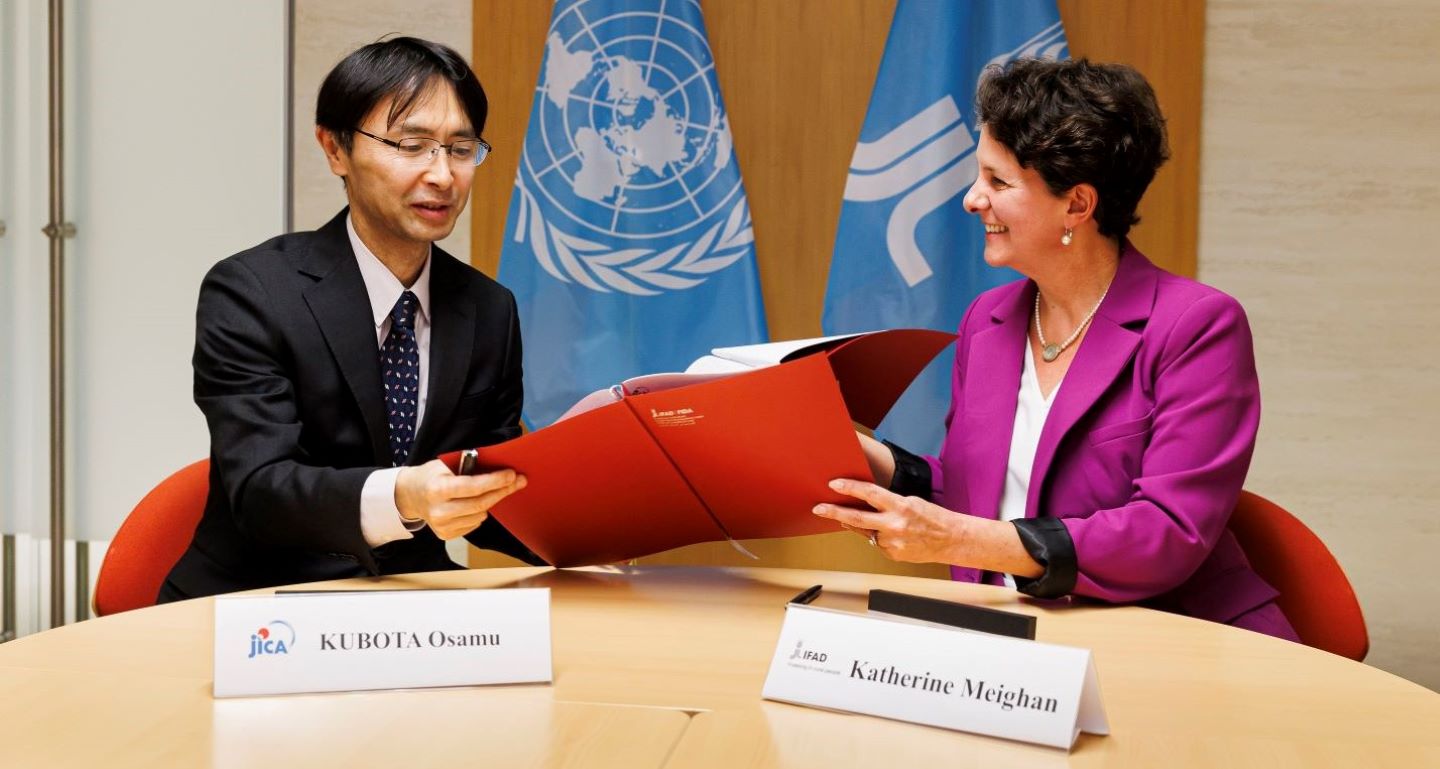IFAD and JICA Renew their Memorandum of Cooperation for Rural Development, Food and Nutrition Security
IFAD Asset Request Portlet
Agrégateur de contenus
IFAD and JICA Renew their Memorandum of Cooperation for Rural Development, Food and Nutrition Security
06 mars 2024
Rome, 6 March 2024 - In a renewed Memorandum of Cooperation (MoC), the UN’s International Fund for Agricultural Development (IFAD) and the Japan International Cooperation Agency (JICA) agreed yesterday to reinforce their collaborative efforts to enhance rural development, food and nutrition security, with a special focus on Africa.
“Food security in Africa and globally is more important than ever. This renewed commitment for IFAD and JICA to collaborate comes at a critical time and is marked by shared values and a promise to making a positive difference in the lives of rural people,” said Katherine Meighan, Associate Vice-President, External Relations and Governance a.i. and General Counsel, IFAD, at the signing ceremony.
“For JICA, IFAD has been a key partner in promoting resilience of the food and agriculture sector. Building upon successful JICA Africa Food Security Initiative including rice production, horticulture value chains, and reinforce food and nutrition security in Africa, we would like to strengthen our collaboration in a timely and effective manner to maximise the impacts of our partnership in the future.” said Kubota Osamu, Vice-President of JICA.
The first MoC between the two agencies was signed in 2010. Under the previous MoC 2018-2023, IFAD and JICA broadened the ongoing collaboration, specifically focusing on initiatives and projects across Africa. Sustainable agricultural practices were identified, developed and knowledge was shared amongst stakeholders.
The Smallholder Horticulture Empowerment and Promotion (SHEP) Approach, a unique agricultural extension method based on supporting smallholder farmers in market-oriented horticulture, is one successful example of the cooperation between IFAD and JICA. It was originally developed through a technical cooperation project in Kenya by JICA. Since IFAD and JICA announced a joint declaration for better lives of one million small-scale farmers at the seventh Tokyo International Conference on African Development (TICAD 7) in 2019, IFAD has adopted the SHEP Approach that has focused on training farmers’ organizations to switch their mindsets from "grow and sell" to "grow to sell". This market-oriented approach has become an integrated part of IFAD-financed projects in African countries, such as Burkina Faso and Malawi.
Under the new phase of the partnership, IFAD and JICA will expand the implementation of these initiatives beyond Africa. Additionally, the two agencies aim to explore opportunities for joint efforts through South-South and Triangular Cooperation to develop agricultural value chains through private sector partnerships, and deepen agricultural research, policy dialogue, co-finance, and innovative finance.
In December 2023, Japan announced a pledge of US$42.7 million to the thirteenth replenishment of IFAD’s resources (IFAD13). IFAD is on track to achieve its largest replenishment ever, aiming to raise US$2 billion to positively impact the lives of 100 million rural people over the period 2025-2027.
Japan and IFAD share their commitment to achieve global food security and improved nutrition with a focus on low-income and lower-middle-income countries, particularly in Africa and Asia. Japan is a key partner and Member State of IFAD. With a total contribution of US$662.0 million to IFAD’s regular replenishments since 1977, Japan is the Fund’s eighth largest contributor.
About us:
IFAD is an international financial institution and a United Nations specialized agency. Based in Rome – the United Nations food and agriculture hub – IFAD invests in rural people, empowering them to reduce poverty, increase food security, improve nutrition and strengthen resilience. Since 1978, we have provided more than US$24 billion in grants and low-interest loans to fund projects in developing countries.
JICA is a governmental organization in Japan that coordinates and implements international economic and social development assistance. JICA provides assistance to developing countries in various forms, including technical cooperation, grant aid, and Japanese ODA loans, with the aim of promoting sustainable development and improving the well-being of people.
Press release No.: IFAD/17/2024
IFAD is an international financial institution and a United Nations specialized agency. Based in Rome – the United Nations food and agriculture hub – IFAD invests in rural people, empowering them to reduce poverty, increase food security, improve nutrition and strengthen resilience. Since 1978, we have provided more than US$24 billion in grants and low-interest loans to fund projects in developing countries.
A wide range of photographs of IFAD’s work in rural communities are available for download from its Image Bank.